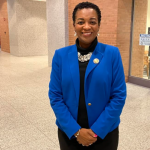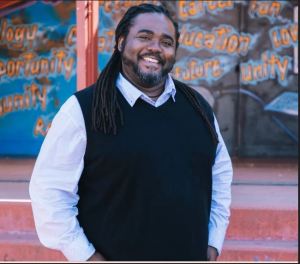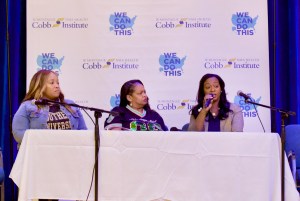By Nicole S. Daniel
The Birmingham Times
District Attorney Lynneice Washington, who is currently serving her second term as Bessemer Cutoff District Attorney, could determine the charges, if any, are brought against Carlee Russell.
On July 13, Russell vanished after telling a 911 dispatcher that she saw a toddler walking alone on the side of an interstate.
Russell’s alleged abduction was a “hoax,” said Hoover Police Chief Nick Derzis, after reading a letter from the 25-year-old’s attorney during a press conference on Monday, July 25.
Hoover is in the jurisdiction of Washington, who said she has spoken with Derzis about possible charges against Russell, according to CBS42 (WIAT-TV). However, Washington also said that ultimately the decision on whether a warrant is issued lies with the magistrate, a decision could be made this week.
If it is determined that Russell must pay back law enforcement for their time and efforts, restitution can be issued, said Washington, according to the TV station.
Jay Town, former U.S. District Attorney for the Northern District of Alabama, said it is “absolutely a possibility” that Russell will have to pay law enforcement departments back for their time and resources.
“The most likely charge, if she is charged, is filing a false report with law enforcement, which is a class A misdemeanor,” Town said. “If there were any obstructive behaviors by any individuals, especially as it might relate to federal law enforcement, that’s certainly a much more serious offense.”
So, who is Washington?
She is a mother, wife, breast cancer survivor and the first Black woman elected as DA in the state of Alabama in 2016. She won re-election in November with 26,635 votes or 53.25 percent.
Washington told the Birmingham Times in December that as an elected official she is “present in the community by attending and participating in church programs; supporting the schools with various [activities] … reading to our younger generation and discussing the law with middle and high school students about preventive, crime fighting methods.”
In addition, she is active in giving ex-offenders an opportunity to obtain employment with the Second Chance Hiring Fair, she said.
In 2017, she created a task force with the U.S. Marshals to capture individuals with outstanding warrants who committed violent crimes as one of her proud moments since becoming the DA of Bessemer Cutoff, as well as starting the very first Conviction Integrity Unit in the state of Alabama. It reviews the cases of wrongful convictions.
Breast Cancer Survivor
Washington, 55, is also visible at numerous breast cancer prevention events throughout the Birmingham metro area.
In 2010, she remembers campaigning for a district judge seat in the Bessemer Division. Her husband was preparing for a trip to Iraq to work on a contract for the Department of Defense.
“I had come from a speaking engagement. I was sitting on my bed, still wearing my suit—I was tired. I was watching an infomercial on television, which said women should do self-checks for breast cancer,” she recalled. “I just did it on a whim, and I found a knot on my breast under my armpit area. I said, ‘Hmm, OK. I’ll let my doctor know.’ I didn’t think anything of it, I was just going forward.”
Diagnosed in August of that year, Washington had a bilateral mastectomy the following September and went forward with chemotherapy and radiation.
Washington didn’t win the district judge seat that year, but she did move forward. In 2016, she was elected district attorney for the Bessemer Cutoff. She also found a way to help others through Brenda’s Brown Bosom Buddies, a 501(c)(3) organization dedicated to supporting people with breast cancer, as well as providing education and promoting early detection of breast cancer in minority, low-income and underserved communities.
“As women, we are nurturers but we nurture other people,” Washington said. “We’re always the last person we take care of. We put ourselves at the bottom of the totem pole and consider everyone else.”
She told the Times in the December interview that her diagnosis was “life altering. As women, we don’t define ourselves in our chest and our behind … It’s about being feminine. To know that I was going under with breasts, and knowing when I wake up I wasn’t—that was something to think about.”
Although she didn’t want to accept the diagnosis, at some point it settled in, she said.
“It took a minute to really resonate within me. When I realized that I was the one diagnosed with cancer—because when I was first diagnosed, I just went full throttle with the [political] campaign—I guess I just kind of took on the mindset that maybe it’ll go away if I ignore it. It doesn’t work that way with cancer,” she told The Birmingham Times in 2017.
Now, she stresses the importance of breast cancer education and early detection.
“If you detect breast cancer early, you can prevent it from spreading, and it can be controlled,” she said. “Sometimes, we wait for a very long time and don’t get examinations. We don’t care for ourselves. We care for others, and that could turn out not so well for us, so education is very important.
“It’s always good to be educated so you know how to take care of yourself and what you should do if you think you have cancer. It is important to always get annual checkups just to be safe.”
Walking in Her Purpose
Washington was born and raised in the northern side of Birmingham in a two-parent household and with a brother 15 years older.
“My family and I lived in an area called Acipco. Some people call it Sippy Co, but it was an area where people with low to moderate income, more low than moderate, resided,” she said.
She remembers the apartment complex not having much grass, but she was holding a broom in a picture from her childhood. “I was just as happy as I wanted to be. And I look at that picture like ‘wow.’ I was a little girl that was really impoverished in an area that really doesn’t have much, but I was a happy baby.”
For kindergarten she attended a church school called Christian Valley. “That was my educational foundation. They taught us about the Bible … But that’s where we learned how to sound out letters and to pronounce words. I can remember that being a happy time,” Washington recalled.
She attended A.H. Parker High School in Birmingham where she joined the school’s choir. “I sang alto. I remember the choir director [Dr. Perry Anderson] was well respected. We had to sing from our diaphragm. We had to sit straight up and put our hands on our legs while singing.”
Washington’s most memorable moment being in the choir was making an album with Nell Carter, a singer and actress from Birmingham who appeared on sitcom Gimme a Break! in 1981 until 1987. “I still have that album now. She had a booming voice. We practiced with her and did a concert.”
Another memorable moment was when the choir traveled to Carnegie Hall in New York City her senior year. “That was a goal for me,” she said. “Anybody in the choir knew they had to sing well enough to be selected. It was huge for me and my family to be able to go.”
Washington said $300 was a lot of money and that others contributed to her travel expenses. “That was the very first time I saw homelessness. People were lying on the streets early in the morning,” she said.
Growing up, Washington knew she would become a lawyer. “There’s nothing else I’ve ever dreamed of being,” she said. “I gravitated to shows like Wonder Women the Bionic Woman, Perry Mason Shows and as time went on Law & Order shows.”
Washington graduated from Auburn University in Montgomery in December 1990 with a bachelor’s degree in criminal justice and would eventually find her way to Miles Law School at the recommendation of friend who was a Municipal Court Judge at the time.
In May of 1995, she graduated from law school while she was five months pregnant with her son Clinton, now 28, passed the bar, introduced herself to some judges to get appointed cases for people who couldn’t afford an attorney and was given cases in Birmingham, Bessemer and Walker County.
In 2002, Washington went to the DA’s office in Bessemer wanting to speak with a prosecutor regarding a case. “I got along well with the entire office, so they approached me about working in their office,” she said.
She worked there up until 2010 when she ran unsuccessfully for District Judge.
In February of 2011, she was appointed as Municipal Court Judge for the city of Bessemer and the following year Bessemer held its very first amnesty court where residents with outstanding warrants came to court if they have committed an offense, pay their fine or set up payments without being detained. “At first people thought it was a setup. They were really skeptical but I did tell them if you have an outstanding warrant for a violent crime, you will be detained,” she said.
Washington said the first amnesty court was a huge success and it changed lives. “We called it Operation Clean Slate.” That’s how individuals got to know her as a judge.
“My reputation in the community is ‘she’s fair. She will give you an opportunity the first time but if you’re stubborn all bets are off,’” she told the Birmingham Times in December.











